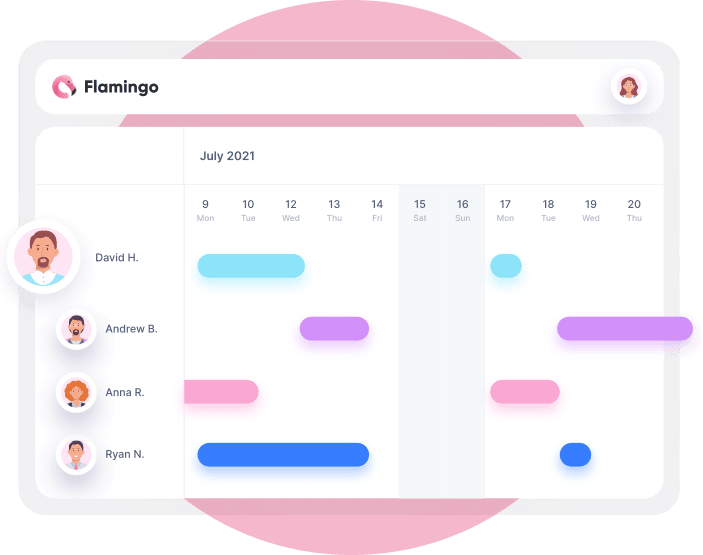
Flamingo is a leave management solution built for modern teams.
No more cluttered spreadsheets and manual data entry. Manage your entire team's leave, directly from Slack, and speed up your leave management workflow.
Learn moreIn this page, we’ll break down all you need to know about leave laws in Romania.
Read on to learn about employees’ rights in regards to paid time off/annual leave, sick leave, parental leave, national/public holidays, and more.
This page is intended for reference purposes only and does not constitute legal advice. Please see official government sources or consult a legal professional for actual legal advice.
All employees in Romania are entitled to paid annual leave. The annual leave entitlement for full-time employees is a minimum of 20 working days.
Employees working in difficult, dangerous or unhealthy conditions, visually
impaired persons, other disabled persons and young people under the age of 18 get an additional three working days off per year.
Employers are required to arrange so that employees can take at least one uninterrupted period of 15 working days off each year.
Employees are instructed by law to take leave within the year it was given. However, if there are objective reasons the employee couldn’t take all their leave, it will carry over and be available until the end of the following year.
Payout of unused leave as cash is not allowed, except for at the end of the individual’s employment contract (e.g. when the employee leaves their job).
Learn more about Use It or Lose It policies here.
All employees are entitled to sick leave in Romania.
For the first five days being off work, the employee will be compensated by their employer,
After that period, as long as the employee has contributed to the social health insurance system for at least six of the previous 12 months, they will be eligible to receive a sickness benefit for up to 183 days per year. This is paid at an equivalent of 75% of their average monthly wages.
Employees suffering from tuberculosis, a contagious disease, or HIV are entitled to 100% of their regular wage as sickness benefit.
Employees in Romania are also entitled to take leave to care for their sick child under the age of seven years old (increased to 18 if the child has a disability, or 16 if the child has a serious disease), and receive a benefit from social health insurance during this time.
This benefit is paid at 85% of the employee’s average monthly wages, for up to 45 days per year.
The Romanian labour code recognizes eight public holidays:
| Day | Holiday |
|---|---|
| January 1 & 2 | New Year |
| March/April | Good Friday |
| Sunday after Good Friday | Easter Sunday |
| May 1 | Labor Day |
| December 1 | National Day |
| December 25 & 26 | Christmas |
Employees who belong to non-Christian religious denominations are entitled to two days off for each of two annual religious holidays (replacing Easter and Christmas).
Public holidays may also include January 24th, June 1st, Whit Sunday and Whit Monday, August 15th and November 30th, however these dates are not mentioned in the Labour Code of Romania as provided by the International Labour Organization.
Public holidays are provided as a paid day off for the employee. If an employee has to work on a public holiday, they’re entitled to a compensatory day off within the next 30 days, or double pay.
Romania provides paid maternity leave of up to 126 calendar days, split between 63 days prior to birth and 63 days after birth. It’s compulsory for mothers to take at least 42 days of leave after birth.
Eligible employees are paid a maternity benefit from social health insurance of 85% of their average monthly income.
The 126 days of maternity benefit is paid out if the child is stillborn.
In addition to regular maternity leave, employees may be entitled to “maternal risk leave” if their employer cannot guarantee that working conditions will be free of risks to the employee’s health or to their child’s health.
This can last up to 120 days before and after maternity leave and should come with the recommendation of a family doctor or obstetrician and gynaecologist.
If granted, the employee can receive maternal risk allowance from social health insurance of 75% of their average monthly income.
Parents or legal guardians (including adoptive and foster parents) are entitled to take leave to look after their children aged up to 2 years (or 3 years if the child is disabled).
The employee is eligible to be paid a benefit from social health insurance during this time, of between RON 1,314 and RON 8,500 per month.
In the case of the death of an employee’s spouse, child, parents or parents-in-law, the employee is entitled to three days’ paid leave.
For the death of grandparents, brothers or sisters, they are entitled to one day of paid leave.
What is Bereavement Leave? Click here to learn more.
Employees are also entitled to leave in the following situations:
https://www.ilo.org/dyn/travail/docs/1630/
https://ec.europa.eu/social/main.jsp?catId=1126&langId=en&intPageId=4750

No more cluttered spreadsheets and manual data entry. Manage your entire team's leave, directly from Slack, and speed up your leave management workflow.
Learn more